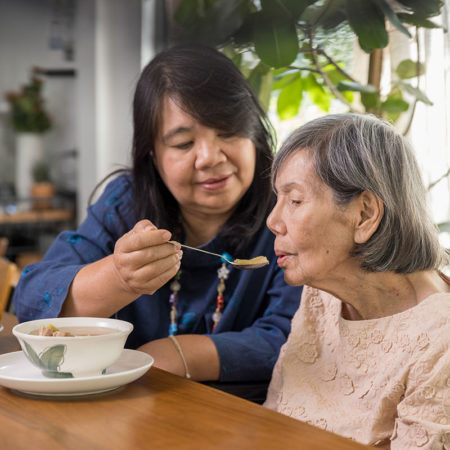
Feeding elderly patients can sometimes be challenging. Changes in cognition, mobility, and energy level might leave a person disinterested in eating.
Mealtimes are important because they provide a welcome break in the day. If it is not too distracting for the person in your care, meals can be eaten with friends or family. It is important that mealtimes be enjoyable, so that the person will look forward to eating. Let’s review some best practices for feeding elderly patients.
First, create a calm environment. This might mean feeding young children in the home at a different time or location, so that you avoid distractions and too much noise. Similarly, turn off the television and instead play relaxing music, perhaps tunes from a senior person’s favorite era.
Prepare the area by making sure all items are within easy reach. Supply easy-to-hold eating utensils, such as those with a wide grip. Avoid cuts by inspecting cups and plates for chips that can tear fragile skin.
Avoid a fussy presentation, especially for someone who has poor vision. Place the same foods in the same spot on the plate every time (e.g., salad at 1 o’clock, protein at 6 o’clock, etcetera). Use simple plates and bowls, preferably of a solid color. Keep in mind that people with weakened vision may have difficulty distinguishing between items of the same color; for example, mashed potatoes on a white plate may be difficult to see, so a darker plate would work better by providing strong contrast. Vision deficits can also lead to confusion if a plate of food is placed on a tablecloth or place mat with a busy design.
Consider eating aids for patients with impaired movement. Online retailers and big-box stores alike carry such items as spoons that swivel for those who have trouble with wrist movement, dishes with high sides that make it easier to scoop food onto a spoon, food-warming dishes for slow eaters, and mugs with two handles.
Lastly, be patient. Allow 30 to 45 minutes for eating. If the person feels rushed, he or she may start to associate negative emotions with mealtimes, which can increase care challenges.
 Whether you are a professional caregiver or a first-time family care partner, feeding an adult person who cannot feed themselves takes special attention. With practice, the activity can go smoothly for you both. Take a deep, calming breath and give these tips a shot:
Whether you are a professional caregiver or a first-time family care partner, feeding an adult person who cannot feed themselves takes special attention. With practice, the activity can go smoothly for you both. Take a deep, calming breath and give these tips a shot:
You might also like: